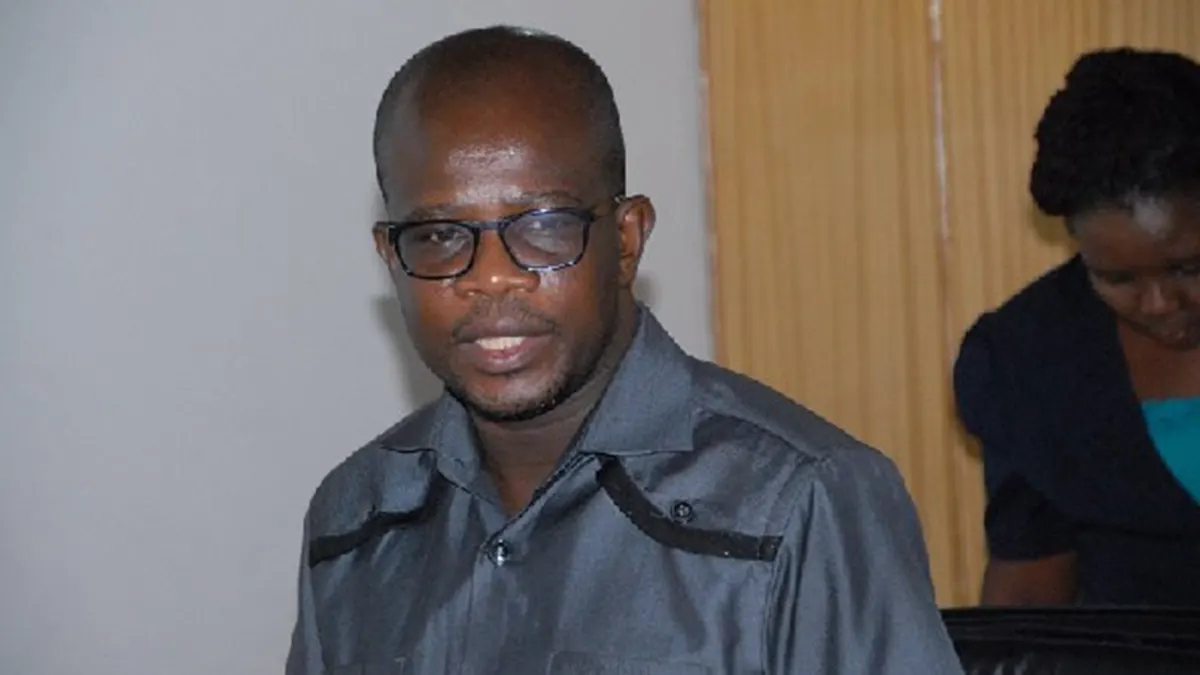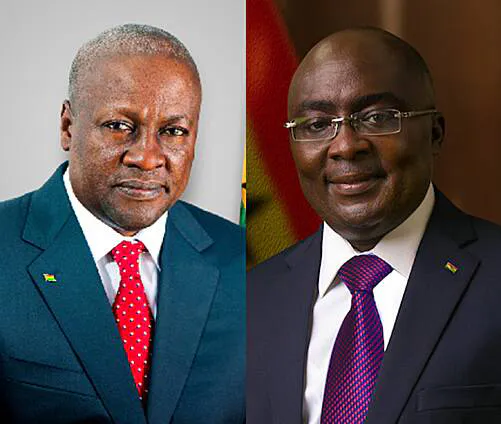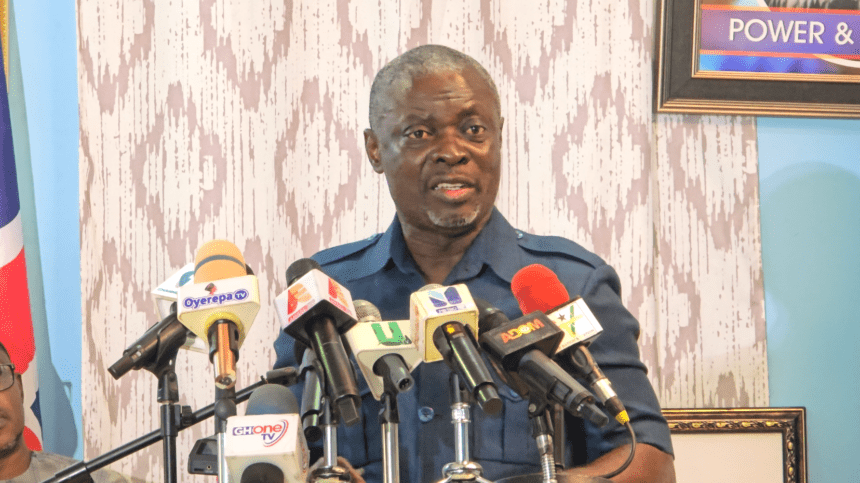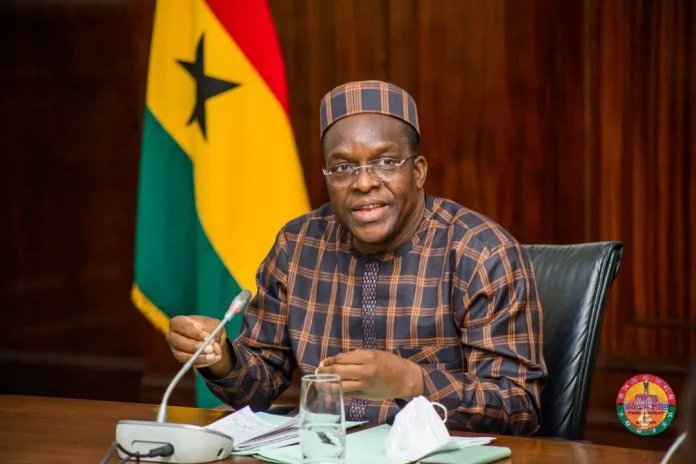Politics
Kpessa-Whyte’s case; Can swift apology save him from contempt charges?
Published
2 years agoon
By
Melody 911FM
1. In the realm of Ghana’s intellectual elite, a distinguished figure emerges from the hallowed halls of the University of Ghana: Professor Michael Kpessa-Whyte. However, this erudite academic finds himself entangled in the intricate maze of quasi-criminal predicaments, courtesy of none other than the venerable Supreme Court of Ghana.
2. Summons have been dispatched, beckoning Prof Kpessa-Whyte to appear before this nation’s most powerful court and present a compelling argument, explaining why he should be absolved of the grave charge of criminal contempt against the nation’s highest judicial authority.
Unraveling the Background: The Assin North Case
3. To comprehend the full panorama, let us dive into the key events that led to this critical juncture. On that fateful day, the 17th of May in the year 2023, the Supreme Court exercised its original jurisdiction, invoked by Michael Ankomah Nimfah on the authority of the harmonious interplay of Articles 2(1) and 130(1)(a) of the Constitution. In a decision that roiled Ghana’s political waters, this august court declared the election of James Gyakye Quayson, Member of Parliament for Assin North, in the December 2020 election as “unconstitutional.”
4. The apex court reasoned that Quayson’s possession of dual nationality, Ghanaian and Canadian, at the time of submitting his nomination papers to the Electoral Commission of Ghana violated Article 94(2)(a) of the Constitution, which expressly precludes parliamentarians from pledging allegiance to any foreign power. Consequently, the nation’s topmost court decreed the expulsion of Quayson from the hallowed halls of Parliament, extinguishing his political tenure.
5. Arguably, this judicial pronouncement stands squarely in line with the precedent established in the annals of Ghana’s legal history, especially in the Ex Parte Dr Zanetor Rawlings case. In that seminal judgment, the Supreme Court unmistakably stated that an unequivocal determination of an individual’s eligibility for parliamentary candidature must be rendered at the time of filing nomination papers. Neither earlier nor later.
6. While Quayson’s party, the opposition National Democratic Congress (NDC), voiced reservations regarding the decision’s legitimacy, its leadership curiously offered their support to the judicially deposed lawmaker in his bid for [re-]election during the inevitable by-election that is soon to result from his expulsion from Parliament.
Prof Kpessa-Whyte’s Ill-fated Tweet
7. In the wake of this momentous decision, Prof Kpessa-Whyte, unable to resist the allure of the Twittersphere, took to his virtual pulpit on the 19th of May. In the limited confines of a tweet, he opined with raw fervor, “They have succeeded in turning a Supreme Court into a Stupid Court. Commonsense is now a scarce commodity. A major element in the death of democracies is partisanship in the delivery of justice. Our judges need lessons in philosophy and ethics.” These words, apparently hastily composed and released into the digital atmosphere, reverberated with astonishing potency. The tweet garnered a multitude of retweets, quotations, and reactions. A symphony of support and condemnation also echoed through the cybersphere.
8. Yet, alas, the original tweet has since vanished from Prof Kpessa-Whyte’s digital realm. In its absence, subsequent epistles sought to elucidate the context and intent behind his initial outburst. On the 23rd of May, 2023, Prof Kpessa-Whyte endeavored to clarify the roots of his thoughts, explaining that his tweet drew inspiration from David A. Kaplan’s magnum opus, “The Most Dangerous Branch: Inside the Supreme Court’s Assault on the Constitution,” as well as recent American attempts to expand the number of justices on the apex court from nine to thirteen. He was keen to emphasize that, at the moment of crafting that tweet, he remained blissfully unaware of the Supreme Court’s Assin North decision.
The Supreme Court’s Authoritative Summons
9. Prof Kpessa-Whyte, a staunch adherent of the “global village” philosophy, underscored that his tweet transcended geographical confines, transcending boundaries to embrace the broader landscape of judicial developments, particularly those transpiring in the United States.
10. In a rather predictable turn of events, the Supreme Court of Ghana, in an act that exudes both gravity and authority, issued criminal summons on this 25th day of May, 2023. The summons, a clarion call demanding Prof Kpessa-Whyte’s presence, details the alleged transgressions that form the crux of the contempt charge. It charges him with scandalizing the court, casting ridicule upon its revered dignity and respect, and inciting prejudice against the very institution that embodies the soul of justice. Prof Kpessa-Whyte’s appearance before the court is set for the 30th of May, 2023, a date that hangs in the balance, pregnant with all manner of implications and possibilities.
Precedents and the Weight of Contempt Charges
11. In this intricate legal needlework, it is prudent to invoke the specter of past precedents that cast a long shadow upon Prof Kpessa-Whyte’s predicament. Cast your mind back to 2016, when the Supreme Court summoned three individuals associated with the now-defunct Muntie FM, entangled in the noose of scandalizing the court and uttering death threats against its esteemed justices.
12. The individuals were Salifu Maase, who hosted the show on which the offending words were uttered, Alistair Nelson, a guest and Godwin Ako Gunn, another guest. The court, with a stern hand, meted out justice, delivering guilty verdicts and sentences on July 27, 2016. The court, in its wisdom, deemed it appropriate to levy a fine of Gh¢10,000 (equivalent to approximately US$2516) upon Maase, better known “Mugabe”, as well as his panelists, Nelson and Gunn.
13. Earlier –– precisely on July 2, 2013 –– Ken Kuranchie of the Searchlight Newspaper was duly sentenced to a period of ten days in confinement, while Stephen Atubiga, a member of the NDC, received a sentence of three days in prison. Their transgressions were traced back to the regrettable act of making prejudicial comments concerning the 2012 election petition case which was then being heard by the Supreme Court.
14. Days later, the court convicted the late Kwadwo Owusu Afriyie, known fondly as Sir John, General Secretary of the New Patriotic Party, and Hopeson Adorye, a member of the party’s communication team, for criminal contempt. They, too, faced the weighty hand of justice, being levied with fines.
15. However, a subsequent act of clemency by then-President John Dramani Mahama, enkindled a sizzling inferno of criticism, eliciting fervent dissent and crystalizing in a suit against the Attorney-General. In the case, known in legal circles as Agbemava, Tuah-Yeboah, Bediatuo v. Attorney-General, the plaintiff challenged the pardon issued by then President Mahama, arguing that he acted in excess of his constitutional authority.
16. In a majority decision, the Supreme Court upheld former President Mahama’s exercise of his prerogative of mercy, which led to the pardon of the three individuals involved in the Muntie FM contempt case. The court affirmed that the executive president of Ghana has the discretionary power to grant pardons, unencumbered by narrow interpretations of the constitutional grant.
17. However, it is worth noting that dissenting opinions were expressed in this case, most notably by Justices Dotse (currently Ghana’s Acting Chief Justice) and Anin Yeboah (the immediate past Chief Justice). They aligned with the plaintiffs’ argument that the president had exceeded his constitutional authority in granting pardon to the contemnors, thereby interfering with the independence of the judiciary. Their dissent underscores the significance of maintaining the boundaries between the executive and judicial branches of government, and the need for the exercise of prerogative powers within constitutional limits.
Ghana’s Legal Framework and Contempt of Court
18. Contempt of court, that nuanced legal concept, finds itself classified in multifarious ways, its form and nature dependent upon jurisdiction and context. A dichotomy emerges between direct and indirect contempt, and a further distinction arises between civil and criminal contempt. The former manifests when one disobeys or disparages the court within its very presence, a blatant affront to the majesty of justice. The latter, however, manifests beyond the court’s confines, as one dares to defy its orders or tamper with its processes ––– a transgression that resonates far beyond its immediate scope.
19. In the landmark case of R. v. Gray [1900] 2 QB 36, Lord Russell of Killowen, C.J. provided a profound definition of Contempt of Court. To paraphrase his elegant words, Contempt of Court encompasses any act or publication that intends to belittle a Court or its judge, eroding their authority. This constitutes one type of contempt. Furthermore, any act or publication that seeks to obstruct or hinder the fair administration of justice or the lawful processes of the Court also falls under the scope of contempt of Court. In the rich embroidery of Ghana’s legal framework, the sanctity of the Supreme Court’s power to punish for contempt finds its foundation rooted in constitutional provisions and statutes. Article 14 of the Constitution jealously safeguards personal liberty but reserves the court’s authority to punish individuals for their contemptuous acts.
20. Article 19, an eloquent ode to the concept of fair trial, empowers superior courts to exercise their punitive might for contempt, irrespective of the act’s definition in written law or the absence of a specifically prescribed penalty. Furthermore, the Courts Act of 1993 fortifies the Superior Courts of Judicature, endowing them with the jurisdiction to address contempt and to issue necessary orders for the enforcement of judgments, decrees, and orders.
21. Further, Article 126(2) also provides that “The Superior Courts shall be superior courts of record and shall have the power to commit for contempt to themselves and all such powers as were vested in a court of record immediately before the coming into force of this Constitution.”
The Power and Autonomy of the Superior Courts
22. In the case of Republic v High Court (Land Division), Accra; Ex – Parte Kennedy Ohene Agyapong (Susan Bandoh as Interested party) (unreported), a remarkable moment of legal discourse unfolded in the hallowed chambers of the learned Supreme Court. Justice Kulendi, eloquently articulated in paragraph 12 that the Superior Courts, when faced with a summons for contempt initiated ex officio in accordance with the provisions of Article 126 of the Constitution, are endowed with a wider scope of jurisdiction. They are not bound, he asserted, by the constraints of subordinate statutes, such as the Criminal and Other Offences Procedure Act, 1960 (Act 30).
23. In this eloquent pronouncement, Justice Kulendi aptly emphasized the elevated position occupied by the Superior Courts, granting them the freedom to exercise their powers with a level of autonomy and independence but within the confines of the constitution. The learned Justice’s assertion eloquently underscores the fundamental principle that the Superior Courts, in the discharge of their duties, are guided primarily by the dictates of the Constitution and the lofty ideals enshrined within it. They are not shackled by the limitations imposed by ordinary legislative enactments.
24. The eminent Justice’s erudite observation serves as a reminder that the Superior Courts, as custodians of justice, are entrusted with the solemn duty of upholding the principles of fairness, impartiality, and the rule of law. By acknowledging the wider latitude granted to them in matters of contempt, the Superior Courts demonstrate their unwavering commitment to preserving the bliss of sanctity around the judicial process and safeguarding the integrity of the legal system.
Prof Kpessa-Whyte’s Prompt Apology and Retraction
25. In the face of these profound events and statutory provisions, Prof Kpessa-Whyte, displaying what seems a healthy dose of sagacity and expedience, hastened to issue a statement of contrition mere hours after the summons had been served. In this communiqué, released at precisely 4:30 pm, he extended an unreserved apology for the tweet that had sparked this inferno.
26. He asserted that his tweet had drawn inspiration from a book and discussions encompassing recent political and judicial developments in the United States. Prof Kpessa-Whyte steadfastly stressed his ignorance regarding the Supreme Court’s Assin North decision at the moment of crafting that fateful tweet. However, profoundly cognizant of the gravity of the situation, he acknowledged the unintended consequences wrought by his choice of words and expressed remorse for any discomfort caused to the Chief Justice, the Supreme Court, and the judiciary as a whole.
27. The renowned Lecturer wrote: “Sincerely, the tweet was not done with the intent to scandalize, or denigrate a revered institution such as the Supreme Court of Ghana for which I have tremendous amount of respect and admiration. These are consequences I never intended, although I do accept responsibility that, I could have exercised better judgment in my choice of words.”
28. He went on, “Please permit me to state unequivocally that I have no reason to slander our Supreme Court, and I hereby sincerely apologize unreservedly for any pain and discomfort my tweets may have caused the Chief Justice, the Supreme Court and the entire judiciary.” In an act of retraction, the tweet in question was wholly eradicated from the digital sphere, a symbolic act of remorse and recognition of the sacredness of the judicial institution. He wrote: “I hereby retract the tweet in question; accordingly, the tweet has been deleted completely and I pray for forgiveness. Thank you.”
Conclusion: Balancing Freedom of Expression and Judicial Dignity
29. Based on the foregoing, including precedents such as Muntie 3, Kuranchie’s case, Atubiga’s case, and the cases of Sir John and Adorye, the outcome of Prof Kpessa-Whyte’s case is uncertain. However, legal experts suggest that his prompt apology and retraction might influence the Supreme Court’s final decision. By expressing remorse and recognizing the unintended consequences of his tweet, he could potentially lessen the severity of the contempt charge. Ultimately, the Supreme Court will thoroughly consider all relevant factors to ensure the administration of justice while maintaining the dignity of the judiciary.
30. As this riveting saga unfolds, it implores us to reflect upon the delicate balance between the freedom of expression as guaranteed under Article 21(1)(a) of the constitution and the responsibility to uphold the dignity and independence of the judiciary. It compels us to recognize the significance of expressing criticisms and dissent in a manner that preserves the public’s confidence in the judiciary and upholds the sanctity of justice. Within the confines of our legal system, let us imbue our discourse with prudence, responsibility, and an unwavering commitment to fostering a culture of constructive engagement. For it is within the crucible of respect, accountability, and veneration for the judiciary that we forge the enduring strength and credibility of our legal system.
You may like
Politics
Bawumia- “Mahama’s Economic Record Bad”
Published
2 weeks agoon
November 11, 2024By
Melody 911FM
The presidential candidate of the New Patriotic Party (NPP), Vice President Dr. Mahamudu Bawumia, has openly criticised former President John Dramani Mahama’s economic management, describing it as the worst among Ghana’s Fourth Republic leaders.
According to him, during Mr. Mahama’s tenure, the economy experienced substantial setbacks across multiple sectors, marked by soaring inflation, sluggish growth, and increasing unemployment.
Speaking at the Ghana CEO Presidential Gala in Accra last Thursday, Dr. Bawumia asserted that his criticism was based on hard economic data rather than partisan views.
He contrasted this with what he described as Ghana’s improved economic trajectory under NPP leadership, asserting that Mr. Mahama’s tenure represented a “decisive failure in economic stewardship.”
Dr. Bawumia stressed that his analysis was intended to highlight the need for sound economic management and that his remarks were meant to shed light on measurable outcomes of Mr. Mahama’s policies, which he said weakened the country’s economic resilience.
The NPP presidential candidate expressed his commitment to building on the progress achieved under the Akufo-Addo administration.
He underscored the importance of data-driven policies and positioned himself as the candidate most capable of navigating Ghana through future economic challenges.
“Despite the impact of global economic challenges, it might surprise some, including the former president himself, that his administration ranks the lowest in economic performance among all Fourth Republic leaders,” Dr. Bawumia reiterated.
He continued, “Yet, he speaks about our economic performance as though his was superior.”
Business Development
Dr. Bawumia also used the opportunity to reaffirm his commitment to strengthening business development in the country, stressing that resilient businesses are foundational to a thriving economy.
He praised the role of the private sector in creating jobs, driving innovation, and fostering sustainable growth.
The NPP flagbearer detailed policies introduced by the current administration to support Ghanaian businesses, including initiatives aimed at enhancing entrepreneurship, expanding access to credit, and advancing digitalisation.
According to Dr. Bawumia, these steps are critical to building a competitive, innovative, and resilient business sector.
He promised that, if elected, he would continue to prioritise business growth in order to ensure the Ghanaian economy remains vibrant and competitive on a global scale.
“Ladies and gentlemen, as you may know, Bawumia means business! From banking to vice presidency, my commitment to business development has been unwavering.
“Strong businesses lead to a strong economy—show me a prosperous nation, and I’ll show you resilient businesses behind it,” he concluded.
Politics
NPP, NDC have mismanaged Ghana – GUM
Published
2 weeks agoon
November 11, 2024By
Melody 911FM
The Ghana Union Movement (GUM) has criticised the New Patriotic Party (NPP), and the National Democratic Congress (NDC) for “mismanaging the country” and supervising the sale of state-owned businesses bequeathed by previous governments.
The Party said the sale of state-owned factories to private individuals and failure to revive defunct state enterprises largely accounted for the growing youth employment situation that had bedeviled the country.
These were contained in a news release issued by the Party’s founder and leader, Reverend Christian Kwabena Andrews, and shared with the Ghana News Agency.
The GUM urged the youth to “be concerned about their future” and vote to break the duopoly enjoyed by the NPP and NDC for decades.
“Embracing both NDC and NPP as a party is just endorsement of the continuity of the Ghanaian predicament. Ghanaian youth must rise to vote massively against these parties, because they were the source of our problems today,” it said.
The GUM said the slow pace of development since the commencement of the Fourth Republic in 1992 justified the call for the “total overhaul” of the 1992 Constitution “considering the mess caused by both NDC and NPP government respectively.”
The Party proposed the adoption of what it termed as “Hybrid African Democracy” which it said was suitable governance model for the country.
“The current model was copied line, hook, and sinker from the West, where they have established and structured institutions to make their democracy work,” it said.
The GUM also called for downsizing of Parliament to reduce the cost of running the business of the House.
The Party said that salaries and benefits awarded to 275 Members of Parliament as well as Article 75 Office Holders “drain the national purse than building it.”
“We urge the public to vote for the Ghana Union Movement for a reliable, better Ghana with the Ghanaian youth as its core,” the Party said.
The GUM caused a stir when it placed third in the 2020 presidential election, beating the traditional Convention People’s Party, People’s National Convention, and the Progressive People’s Party.
The party garnered 105,548 votes, representing 0.805 per cent of the total ballots cast.
Rev. Andrews has indicated that the Party would build on its achievements in 2020 and affect the 2024 presidential and parliamentary elections.
The GUM has promised to establish factories in every region and operate a free port to boost economic activities and improve the living conditions of the people.

In a significant development, Ghana’s Parliament Speaker, Alban Sumana Kingsford Bagbin is set to address the media on Wednesday, November 6, 2024.
The press conference, scheduled for 2:00 pm at the Justice D.F. Annan Auditorium, Job 600, Parliament House, aims to tackle critical issues affecting Ghana’s parliamentary democracy.
Recent Developments
Alban Bagbin’s address comes amidst significant political developments in Ghana.
As Speaker, he has played a pivotal role in shaping the country’s legislative agenda.
His leadership has been marked by efforts to strengthen parliamentary oversight and promote transparency.
The engagement seeks to provide a platform for the media to discuss pressing concerns impacting Ghana’s democratic growth.
The Speaker, Alban Bagbin, is expected to shed light on recent events that have shaped the country’s political landscape.

Bawumia- “Mahama’s Economic Record Bad”

Peter Okoye reacts to alleged song ownership by twin brother
















